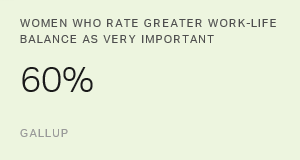PRINCETON, NJ -- By 51% to 44%, women in the U.S. are more likely to say that, if free to do either, they would rather have a job outside the home than "stay at home and take care of the house and family." Women's preferences for working outside the home have been consistent in Gallup polling since 2007, and were also evident in 2001; however, at other times in the not-too-distant past -- 1992, 2003, and 2005 -- the majority of women favored the domestic role.
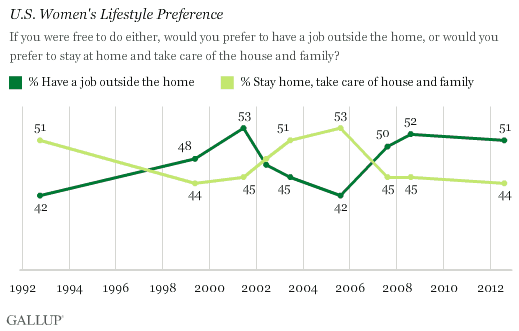
Still, women's preferences for having a job outside the home are far less prevalent than men's, despite a half century of cultural change that has opened up the workplace to women. Three-quarters of men say that, if free to do either, they would rather have a job outside the home than stay at home, with the 76% choosing it this year the highest yet.
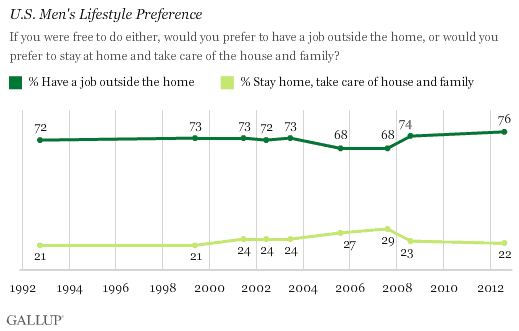
Although women account for nearly half the U.S. labor force, a smaller percentage of all U.S. women work full time than do men -- 60% of men vs. 41% of women -- according to Gallup Daily tracking data from August. This may partially account for why women are less likely than men to prefer a job outside the home. Still, even employed women are significantly less likely than employed men to say they would prefer to have an outside job: 57% vs. 72%.
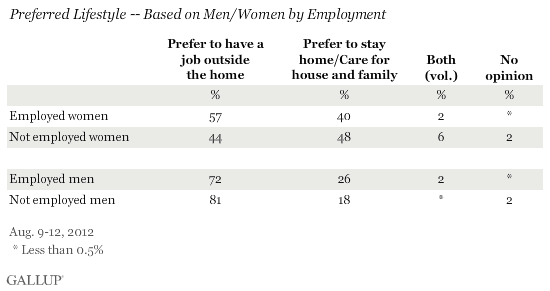
Notably, age is not much of a factor in the lifestyle preferences of either men or women.
Women aged 50 and older are slightly more likely than women aged 18 to 49 to indicate a preference for staying home: 48% vs. 41%. However, about half of both groups of women would rather have a job outside the home. Men's views are no different by age.
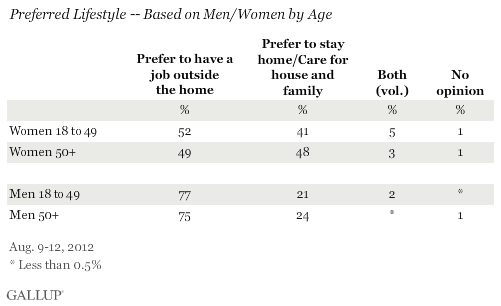
Education and Marital Status Relate to Women's Preferences
Women with at least some college education would opt for having a job outside the home over being a homemaker, 57% to 38%. By contrast, women with no college experience tilt the other way, with 53% preferring to stay home and 41% preferring to have an outside job.
In terms of marital status, unmarried women show a decided preference for having a job outside the home rather than staying home, 55% vs. 42%, if they were free to do either. Married women are about evenly split on the question.
Men's views do not appear to be related to their education or marital status.
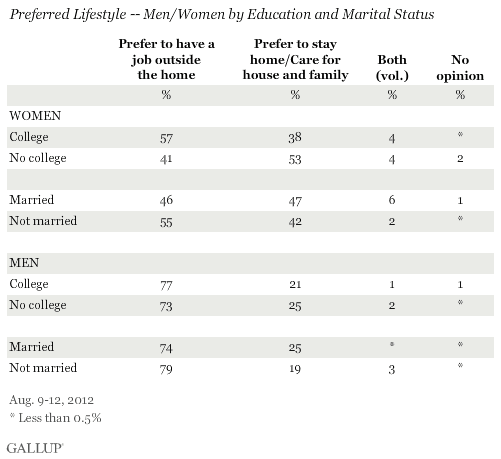
Homemaking Relatively More Popular Among Republican Women, Democratic Men
One variable that does relate to the lifestyle preferences of both men and women is party affiliation; however, it works in different ways.
Republican women are more likely than Democratic women to say they would ideally want to stay home and care for the home and family: 57% of Republican women vs. 37% of Democratic women. At the same time, Republican men show a stronger leaning than Democratic men for working outside the home: 81% vs. 71%. Accordingly, by 27% to 18%, Democratic men are more likely than Republican men to say they would prefer being a homemaker to an outside job.
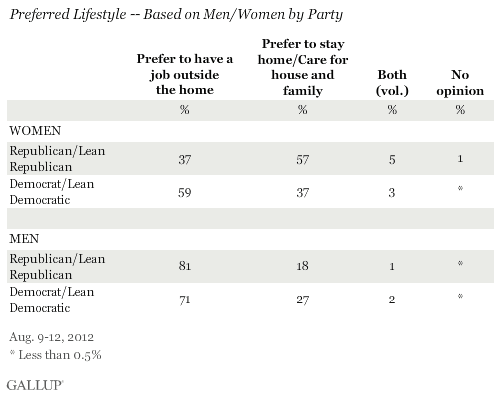
Bottom Line
The slight majority of women today say they would opt to have a job outside the home, even if they were free to choose to be a homemaker, similar to their views in 2007 and 2008. Still, a major gender gap persists on this fundamental lifestyle choice, with three-quarters of men preferring to have an outside job, unchanged since 1992.
Not only is this gender gap partially explained by the desires of older, married, less educated, and Republican women -- all groups in which the majority prefer to stay home -- but also by younger, unmarried, college educated, and Democratic women who are significantly less likely than their male counterparts to say that they would want an outside job if they were free to be a homemaker instead.
Survey Methods
Results for this Gallup poll are based on telephone interviews conducted Aug. 9-12, 2012, with a random sample of 1,012 adults, aged 18 and older, living in all 50 U.S. states and the District of Columbia.
For results based on the total sample of national adults, one can say with 95% confidence that the maximum margin of sampling error is ±4 percentage points.
For results based on the sample of 514 men, the maximum margin of sampling error is ±6 percentage points.
For results based on the sample of 498 women, the maximum margin of sampling error is ±6 percentage points.
Interviews are conducted with respondents on landline telephones and cellular phones, with interviews conducted in Spanish for respondents who are primarily Spanish-speaking. Each sample includes a minimum quota of 400 cell phone respondents and 600 landline respondents per 1,000 national adults, with additional minimum quotas among landline respondents by region. Landline telephone numbers are chosen at random among listed telephone numbers. Cell phones numbers are selected using random digit dial methods. Landline respondents are chosen at random within each household on the basis of which member had the most recent birthday.
Samples are weighted by gender, age, race, Hispanic ethnicity, education, region, adults in the household, and phone status (cell phone-only/landline only/both, cell phone mostly, and having an unlisted landline number). Demographic weighting targets are based on the March 2011 Current Population Survey figures for the aged 18 and older non-institutionalized population living in U.S. telephone households. All reported margins of sampling error include the computed design effects for weighting and sample design.
In addition to sampling error, question wording and practical difficulties in conducting surveys can introduce error or bias into the findings of public opinion polls.
View methodology, full question results, and trend data.
For more details on Gallup's polling methodology, visit https://www.gallup.com/.
